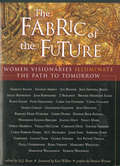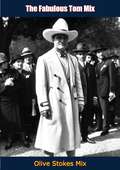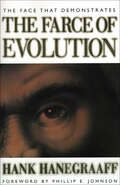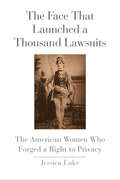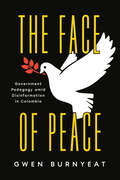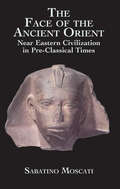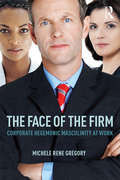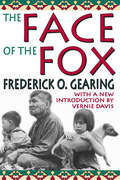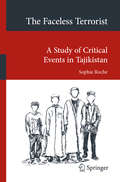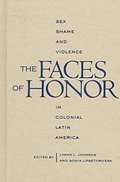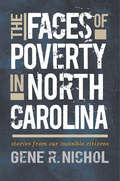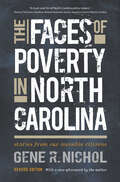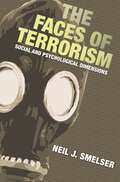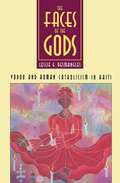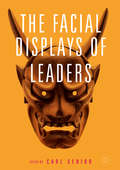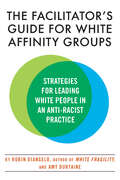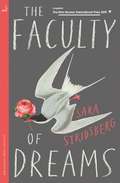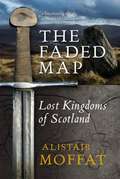- Table View
- List View
The Fabric of the Future: Women Visionaries Illuminate the Path to Tomorrow
by M. J. RyanWith contributions from Gloria Steinem, Nancy Mairs, Marianne Williamson, and other forward-looking women, “there is plenty of wisdom in these pages” (Publishers Weekly).This collection includes essays by women—from psychologists to activists to artists—who represent a wide range of philosophies, religions, spiritualities, and ethnicities, but share the goal of creating a new age of transformation. Surveying the cultural landscape, they offer their insights into how we can navigate from chaos to clarity—and help create a better tomorrow.Contributors include: Joan Borysenko * Brooke Medicine Eagle * Shakti Gawain * Starhawk * Gloria Steinem * Jean Houston * Marianne Williamson * Caroline Myss * Angeles Arrien * Vimala McClure * Marion Woodman * Jean Shinoda Bolen * Joanna Macy * and many more“A timeless book . . . filled with wisdom both feminine and universal.” —Dan Millman, author of Way of the Peaceful Warrior“Much trenchant thinking and many healing ideas.” —Yoga Journal“It is impossible to read this book and not be glad that you were born a woman.” —Rachel Naomi Remen, MD, New York Times-bestselling author of Kitchen Table Wisdom
The Fabulous Tom Mix
by Olive Stokes Mix Eric HeathAn excellent firsthand account of the famed cowboy movie star.Tom Mix (1880–1940) was an American motion picture actor, director, and writer whose career spanned from 1910 to 1935. During this time he appeared in 270 films and established himself as the screen's most popular cowboy star. Mix's flair for showmanship set the standard for later cowboy heroes such as Gene Autry and Roy Rogers. His horse Tony also became a celebrity who received his own fan mail.
The Face That Demonstrates the Farce of Evolution
by Hank HanegraaffLooking into the face of our alleged ape ancestor, popular Christian apologist Hank Hanegraaff dissects and debunks the astonishingly weak arguments for the evolutionary theory, revealing it as nothing more than a "fairy tale for grown-ups." The author uses his own Memory Dynamics to make it easy for Christians to speak intelligently about evolution and speak persuasively about the Creator.
The Face That Launched a Thousand Lawsuits: The American Women Who Forged a Right to Privacy
by Jessica LakeA compelling account of how women shaped the common law right to privacy during the late nineteenth and early twentieth centuries Drawing on a wealth of original research, Jessica Lake documents how the advent of photography and cinema drove women--whose images were being taken and circulated without their consent--to court. There they championed the creation of new laws and laid the groundwork for America's commitment to privacy. Vivid and engagingly written, this powerful work will draw scholars and students from a range of fields, including law, women's history, the history of photography, and cinema and media studies.
The Face of Eastern European Jewry
by Arnold ZweigThis work brings together the impassioned writing of one of Weimar Germany's most celebrated authors, Arnold Zweig, and the equally poignant illustrations by renowned graphic artist and lithographer Hermann Struck.
The Face of Peace: Government Pedagogy amid Disinformation in Colombia
by Gwen BurnyeatA multi-scale ethnography of government pedagogy in Colombia and its impact on peace. Colombia’s 2016 peace agreement with the FARC guerrillas sought to end fifty years of war and won President Juan Manuel Santos the Nobel Peace Prize. Yet Colombian society rejected it in a polarizing referendum, amid an emotive disinformation campaign. Gwen Burnyeat joined the Office of the High Commissioner for Peace, the government institution responsible for peace negotiations, to observe and participate in an innovative “peace pedagogy” strategy to explain the agreement to Colombian society. Burnyeat’s multi-scale ethnography reveals the challenges government officials experienced communicating with skeptical audiences and translating the peace process for public opinion. She argues that the fatal flaw in the peace process lay in government-society relations, enmeshed in culturally liberal logics and shaped by the politics of international donors. The Face of Peace offers the Colombian case as a mirror to the global crisis of liberalism, shattering the fantasy of rationality that haunts liberal responses to “post-truth” politics.
The Face of Peace: Government Pedagogy amid Disinformation in Colombia
by Gwen BurnyeatA multi-scale ethnography of government pedagogy in Colombia and its impact on peace. Colombia’s 2016 peace agreement with the FARC guerrillas sought to end fifty years of war and won President Juan Manuel Santos the Nobel Peace Prize. Yet Colombian society rejected it in a polarizing referendum, amid an emotive disinformation campaign. Gwen Burnyeat joined the Office of the High Commissioner for Peace, the government institution responsible for peace negotiations, to observe and participate in an innovative “peace pedagogy” strategy to explain the agreement to Colombian society. Burnyeat’s multi-scale ethnography reveals the challenges government officials experienced communicating with skeptical audiences and translating the peace process for public opinion. She argues that the fatal flaw in the peace process lay in government-society relations, enmeshed in culturally liberal logics and shaped by the politics of international donors. The Face of Peace offers the Colombian case as a mirror to the global crisis of liberalism, shattering the fantasy of rationality that haunts liberal responses to “post-truth” politics.
The Face of Peace: Government Pedagogy amid Disinformation in Colombia
by Gwen BurnyeatA multi-scale ethnography of government pedagogy in Colombia and its impact on peace. Colombia’s 2016 peace agreement with the FARC guerrillas sought to end fifty years of war and won President Juan Manuel Santos the Nobel Peace Prize. Yet Colombian society rejected it in a polarizing referendum, amid an emotive disinformation campaign. Gwen Burnyeat joined the Office of the High Commissioner for Peace, the government institution responsible for peace negotiations, to observe and participate in an innovative “peace pedagogy” strategy to explain the agreement to Colombian society. Burnyeat’s multi-scale ethnography reveals the challenges government officials experienced communicating with skeptical audiences and translating the peace process for public opinion. She argues that the fatal flaw in the peace process lay in government-society relations, enmeshed in culturally liberal logics and shaped by the politics of international donors. The Face of Peace offers the Colombian case as a mirror to the global crisis of liberalism, shattering the fantasy of rationality that haunts liberal responses to “post-truth” politics.
The Face of the Ancient Orient: Near Eastern Civilization in Pre-Classical Times
by Sabatino MoscatiThis fascinating, lively study — praised by the American Historical Review as "a valuable introduction, perhaps the best available in English, to the ancient Near Eastern civilizations" — is essential reading for history students and for anyone interested in the development of Western civilization. The author, who was director of the Center of Semitic Studies at the University of Rome, undertook the study in order to make sense of several enormously important discoveries from the mid-twentieth century — including the discovery of Ugarit, a Syrian city that flourished for 4,000 years; the unearthing of Mari, an equally important city of ancient Mesopotamia; and the discovery of the Dead Sea Scrolls.Professor Moscati begins with a chapter on the "Oriental Renaissance" and goes on to examine the Sumerians, Babylonians, Assyrians, Egyptians, Hittites, Hurrians, Canaanites, Aramaeans, Israelites, and Persians, before offering, in the final chapter, a synthesis of Near Eastern accomplishments in politics, society, literature, and the arts. His conclusion is that "the civilizations of the ancient Orient [were] a tremendous human experience … without which another, subsequent civilization would not be conceivable." One of the great pleasures of this intriguing book is its delightful sampling of illustrative quotations from primary sources — some from the Bible and many others (often with strikingly biblical intonations) from the little-known writings of Sumer, Egypt, Hurria, and the other great civilizations that prefigured Greece and Rome.
The Face of the Firm: Corporate Hegemonic Masculinity at Work
by Michele Rene GregoryDespite decades of greater gender awareness at work in Western countries, gender inequality in the executive suites is alive and well. "The Face of the Firm" highlights new critical perspectives on the relationship between hegemonic masculine cultures, gender embodiment, and gender disparities in corporate organizations. Using data from over 100 interviews with female and male executives who worked for some of the most prestigious advertising and computer firms in the world, the book makes important connections between the empirical data and contemporary sexism in the United States and United Kingdom. The book refocuses the debate of executive work, organizational spaces, and gender inequality on gendered bodies at work. It also demonstrates that gendered and sexualized relations among executives often construct the production process. The book makes a contribution to masculinity, gender, and work scholarship and is organized along three key concepts: homogeneity, homosociability, and heterosexuality. These address such factors as the organizational locker room, sexual and heterosexual spaces at work, and the construction of women and men as different workers. This conceptual model is crucial for evaluating the mechanisms that support male dominance among highly skilled professionals and executives."
The Face of the Fox
by Frederick O. GearingIn The Face of the Fox, an anthropological and sociological study of the Fox American Indians (the Mesquakie, their actual tribal name) who live just outside Tama, Iowa, Frederick Gearing puts a face on the peoples of this tribe. In doing so, Gearing particularly deals with the estrangement of the Fox Indians and the Westerners surrounding them. He defines the concept of estrangement as including feelings of contempt, indifference, and pity often leading to misplaced hurt and hate on both sides. Specifically, he states that when one is estranged, he is unable to relate because he cannot see enough to relate to, which is a type of social disconnect. Estrangement shackles both parties, leaving them unable to connect with one another.Finding this is more of a cognitive mental processing problem, Gearing proposes gaining control of the mind, believing the opposite of being estranged is to find a people believable and real. The way to do this is to educate each estranged group about the other and put a face on each group. Educating Westerners about the Fox people they live next to, Gearing describes their community, their social structure, their culture, their language and some of its many meanings, and their view of themselves and how they view their future.Attempting to end estrangement and engender endearment and understanding, The Face of the Fox will be of interest to anthropologists and sociologists focusing on the American Indian.
The Facebook Narcissist: How to Identify and Protect Yourself and Your Loved Ones from Social Media Narcissism
by Lena DerhallyA comprehensive guide for understanding how narcissism on social media impacts our mental health, how to protect ourselves and our children from those affects as well as from narcissists, and how to use social media more mindfully.The Facebook Narcissist is the first book dedicated to exploring the relationship between narcissism and social media. Lena Derhally, a licensed psychotherapist certified in Imago therapy, delves into how social media enhances individual and cultural narcissism and how it may create or exacerbate toxic narcissistic tendencies in people who use it. Using her clinical expertise, along with scientific research and interviews with other experts in the field, she thoroughly examines: how narcissism on social media contributes to false narratives and ruptures relationships; how to identify a narcissist on social media (including how to spot the more subtle sub-types of narcissist, such as the covert, communal, and collective narcissist); how narcissism relates to the &“influencer&” and celebrity culture; narcissism and cyberbullying, cyberstalking, trolling, and victim blaming on social media; narcissism related to racism and politics on social media; the ways social media can create a problem of narcissism in children as they grow up, the implications of "sharenting"; and more. Readers will discover case studies and real examples of narcissists and how they present on social media. Derhally&’s expertise in cultivating healthy, fulfilling, and connected relationships helps guide readers to take a deeper look at their behaviors on social media and of those around them. At the end of each chapter, she gives practical tips and takeaways for navigating narcissism online. Since abandoning our devices is impractical and not likely, this book will help readers understand how to use social media in a balanced way that inspires fulfillment and connection instead of the entitlement, attention-seeking, and lack of empathy that is at the heart of narcissism. Derhally also instructs readers on how they may use social media for good, and as a tool for positive social change. Social media is here to stay, but with education and awareness on how it makes us and the world more narcissistic, we can change the narrative and focus on the ways in which social media can be positive, and even improve the world for the better.
The Faceless Terrorist: A Study of Critical Events in Tajikistan (Transcultural Research – Heidelberg Studies on Asia and Europe in a Global Context)
by Sophie RocheHow could a person portrayed as a terrorist by the Tajik state also be seen as a mujahid fighter in Islam and be a cousin all at the same time? Is this just a matter of perspective and conceptualization? To believe in the protection of concepts to safeguard groups and individuals from the uncertain character of the world, is to deny the existence of chance and the contradictions in life. This book uses approaches from existential anthropology to enquire into the question of how concepts and experiences relate. The focus is on the way the notions jihad, mujahid and terrorism were used during a military intervention in Tajikistan in 2010. The book includes long-term ethnographic material, popular pamphlets on Islam and an internet analysis of the conflict, offering new insights into how concepts and experiences relate. Since the end of the Soviet Union, the people from the republic Tajikistan have struggled to find a place in the larger Muslim world, a painful process unfolding in relation to global events, discourses and politics. The primary readership for the book will come from academia and policy makers. The book presents novel material on a fascinating and highly important topic, the nature of ostensibly Islamist political violence against the state in Tajikistan. John Heathershaw
The Faces Of Honor: Sex, Shame, And Violence In Colonial Latin America (Dialogos)
by Lyman Johnson Sonya Lipsett-RiveraA contemporary of Columbus noted those crazy Spaniards have more regard for a bit of honor than for a thousand lives. This obsession flourished in the New World, where status, privilege, and rank became cornerstones of the colonial social order. Honor had many faces. To a freed black woman in Brazil it proscribed spousal abuse and permitted her to petition the Church for permission to leave her husband. To a high church official charged with sodomy in Alto Peru, honor signified the privileges and legal exceptions available to those of his background and social position. These nine original essays assess the role and importance men and women of all races and social classes accorded honor throughout colonial Latin America. The best work on honor in Latin America and an invaluable and insightful volume. A must for both scholars and classroom use.Professor Susan M. Socolow, Emory University
The Faces of Poverty in North Carolina: Stories from Our Invisible Citizens
by Gene R. NicholThese are the faces of poverty in North Carolina: scores of homeless men, women, and children take refuge in makeshift camps, barely hidden in the woods near some of our most affluent neighborhoods. Hundreds wait in lines hours long to receive basic health care at underfunded free clinics. In large cities and small towns, children--especially children of color--rely on meals at their schools to keep hunger at bay, while parents struggle in jobs that fail to pay living wages. While many in the Tar Heel State enjoy unparalleled prosperity, those born into poverty have lower odds than ever of climbing the ladder of economic upward mobility. Today, more than 1.5 million North Carolinians live in poverty. More than one in five are children. Behind these sobering statistics are the faces of our fellow citizens. This book tells their stories.Since 2012, Gene R. Nichol has traveled the length of North Carolina, conducting hundreds of interviews with poor people and those working to alleviate the worst of their circumstances. Here their voices challenge all of us to see what is too often invisible, to look past partisan divides and preconceived notions, and to seek change. Only with a full commitment as a society, Nichol argues, will we succeed in truly ending poverty, which he calls our greatest challenge.
The Faces of Poverty in North Carolina: Stories from Our Invisible Citizens
by Gene R. NicholMore than 1.5 million North Carolinians today live in poverty. More than one in five are children. Behind these sobering statistics are the faces of our fellow citizens. This book tells their stories. Since 2012, Gene R. Nichol has traveled the length of North Carolina, conducting hundreds of interviews with poor people and those working to alleviate the worst of their circumstances. In an afterword to this new edition, Nichol draws on fresh data and interviews with those whose voices challenge all of us to see what is too often invisible, to look past partisan divides and preconceived notions, and to seek change. Only with a full commitment as a society, Nichol argues, will we succeed in truly ending poverty, which he calls our greatest challenge.
The Faces of Televisual Media: Teaching, Violence, Selling To Children (Routledge Communication Series)
by EDWARD L.PALMER and BRIAN M.YOUNGThis collection offers original, state-of-the-art contributions from leading authorities in children's televisual media. International researchers from communication and psychology provide readers with ready access to current televisual research, trends, and policymaking/political climate issues pertaining to children. This second edition provides a current summary of studies on content, viewing patterns, comprehension, effects, and individual differences in instructional and educational programming, televisual entertainment and violence programming, and televisual advertising to children. Editors Edward L. Palmer and Brian M. Young have structured the volume into three sections examining the "faces" of television: the Teaching (instructional/educational) Face, the Violent Face, and the Selling (advertising) Face. Chapters within each section identify and focus recurrent themes while integrating them topically into a coherent whole. Each area incorporates new technologies and considers their potentials, effects, and future. Subjects featured in the various chapters include: *cross-cultural and historical comparisons with an in-depth perspective on the BBC and other European/Asian televisual media roots, as well as America's formative televisual media roots; *an examination of key differences between developed and developing countries; *implications of emerging instructional/educational media for children's education--addressing both cognitive and multi-ethnic aspects; and * prominent, informed challenge to the prevailing popular view that children are unaffected and unharmed by exposure to media violence. This volume informs ongoing debates across a broad spectrum of current, critical issues, and suggests avenues for future research. It is pertinent and provocative for the most sophisticated scholar in the field, as well as for students in areas of developmental or social psychology, communication, education, sociology, marketing, broadcasting and film, public policy, advertising, and medicine/pediatrics. It is also appropriate for courses in children, media, and society.
The Faces of Terrorism: Social and Psychological Dimensions (Science Essentials #13)
by Neil J. SmelserTerrorism is the most clear and present danger we confront today, yet no phenomenon is more poorly understood by policymakers, the media, and the general public. The Faces of Terrorism is the first serious interdisciplinary examination of terrorism in all its facets. What gives rise to it, who are its proponents and how do they think, and how--and why--does it work? Neil Smelser begins by tackling the fundamental problem of defining what exactly terrorism is. He shows why a precise definition has eluded us until now, and he proposes one that takes into account the full complexities of this unconventional and politically charged brand of violence. He explores the root causes and conditions of terrorism, and examines the ideologies that inspire and fuel it throughout the world. Smelser looks closely at the terrorists themselves--their recruitment, their motivations, the groups they form, their intended audiences, and their uses of the media in pursuing their agendas. He studies the target societies as well, unraveling the complicated social and psychological impacts of having to cope with the ever-present threat of a terrorist strike--and responding when one occurs. He explains what it means to live under constant threat of terrorism, and addresses the thorny domestic and foreign policy challenges this poses. Throughout, Smelser draws from the latest findings in sociology, political science, anthropology, economics, psychology, psychiatry, and history. The Faces of Terrorism provides the breadth of scope necessary to understand--and ultimately eliminate--this most pressing global threat.
The Faces of the Gods
by Leslie G. DesmanglesVodou, the folk religion of Haiti, is a by-product of the contact between Roman Catholicism and African and Amerindian traditional religions. In this book, Leslie Desmangles analyzes the mythology and rituals of Vodou, focusing particularly on the inclusion of West African and European elements in Vodouisants' beliefs and practices.Desmangles sees Vodou not simply as a grafting of European religious traditions onto African stock, but as a true creole phenomenon, born out of the oppressive conditions of slavery and the necessary adaptation of slaves to a New World environment.Desmangles uses Haitian history to explain this phenomenon, paying particular attention to the role of the seventeenth- and eighteenth-century maroon communities in preserving African traditions and the attempts by the Catholic, educated elite to suppress African-based "superstitions." The result is a society in which one religion, Catholicism, is visible and official; the other, Vodou, is unofficial and largely secretive.
The Facial Displays of Leaders
by Carl SeniorThis book provides a multifaceted analysis of how the human face drives many of our most important social behaviors. People perceive the identities, genders, and attractiveness of others from the many different faces they see every day. There has been great deal of research on the psychology, neuropsychology and neuroscience of how these perceptions are formed. However the facial displays of leadership, with their almost ubiquitous role in our social lives, remain largely unexplored. Carl Senior argues that perhaps now more than ever, it is crucial to understand how facial displays communicate leadership abilities. This book brings together perspectives from a range of international experts across a variety of fields including social psychology, organisational sciences and the study of primates, with the aim to further our understanding of this fundamental social force. Scholars and professionals, as well as anyone interested in learning more about how the face is used to drive our perception of leadership, will find this book of great interest.
The Facilitator's Guide for White Affinity Groups: Strategies for Leading White People in an Anti-Racist Practice
by Dr. Robin DiAngelo Amy BurtaineA first of its kind, accessible, in-depth resource for leading effective white racial affinity groups—an essential tool in anti-racism for building the skills and perspectives needed for white people to challenge racism.While there are a few short articles and guides addressing the challenges and complexities of leading white affinity groups, there has never been a detailed handbook exclusively for white racial affinity group facilitators. There are many challenges in facilitating these groups including the need to have a deep theoretical understanding of racism; a high degree of racial self-awareness; sensitivity to and the ability to work with the range of skills and degrees of awareness participants bring; and strong facilitation and conflict resolution skills.The Facilitator&’s Guide for White Affinity Groups is the first in-depth guide for educators, mediators, workplace consultants and trainers, workplace diversity groups, community organizers, conference organizers, members of faith communities, and members of racial and social justice groups.Dr. Robin DiAngelo and Amy Burtaine, who collectively bring over 20 years of experience leading anti-racist education and racial affinity groups present:· a theoretical framework for understanding racism;· a case for the value of racial affinity groups as a tool for challenging racism;· guidelines for setting up affinity groups in a variety of contexts;· the skills and perspectives needed for effective facilitation;· scenarios to illustrate common challenges;· a glossary of definitions;· exercises, discussion prompts, and assessment tools.· an extensive list of common patterns and group dynamics and how to address themWritten accessibly for a wide range of readers and backgrounds, The Facilitator&’s Guide for White Affinity Groups will be an important reference for anyone committed to anti-racism work.
The Facility Manager's Guide to Safety and Security
by John W. HendersonA guide for facility managers of varying types of facilities including, apartment buildings/complexes, office buildings, retail stores, educational facilities (schools), restaurants, and countless others. It will look specifically at the physical similarities inherent in all buildings/facilities and delve into the operational/maintenance needs, access control, audit proceedures and emergency procedure requirements. It provides procedures and policy direction in facilities that are lacking such formalized doctrine and gives a starting point to run their facilities in a consistent manner with a focus on safety and security, as well as keeping control of liability risk.
The Faculty of Dreams: Longlisted for the Man Booker International Prize 2019
by Sara StridsbergIn April 1988, Valerie Solanas - the writer, radical feminist and would-be assassin of Andy Warhol - was discovered dead in her hotel room, in a grimy corner of San Francisco. She was only 52; alone, penniless and surrounded by the typed pages of her last writings.In The Faculty of Dreams, Sara Stridsberg revisits the hotel room where Solanas died, the courtroom where she was tried and convicted of attempting to murder Andy Warhol, the Georgia wastelands where she spent her childhood, where she was repeatedly raped by her father and beaten by her alcoholic grandfather, and the mental hospitals where she was interned.Through imagined conversations and monologues, reminisces and rantings, Stridsberg reconstructs this most intriguing and enigmatic of women, articulating the thoughts and fears that she struggled to express in life and giving a powerful, heartbreaking voice to the writer of the infamous SCUM Manifesto.
The Faded Map: Lost Kingdoms of Scotland
by Alistair MoffatDive into Northern Britain&’s Dark Ages in &“a book which gives a satisfying and convincing account of this little-known part of Scotland&’s history&” (Undiscovered Scotland). Modern communications have driven motorways and pylons through the countryside, dwarfed us with TV and telephone masts, and drastically altered the way in which we move around, see, and understand Scotland. Recent politics and logistics have established borders and jurisdictions which now seem permanent and impervious. The Faded Map looks beyond these to remember a land that was once quiet and green. Alistair Moffat&’s &“tireless research . . . and commanding knowledge&” bring to vivid life the half-forgotten kings and kingdoms of two thousand years ago, from the time of the Romans into the early medieval period (Scottish Field). In this &“fascinating&” account, Moffat describes the landscape these men and women moved through and writes of a Celtic society which spoke to itself in Old Welsh, where the Sons of Prophesy ruled, and the time when the English kings of Bernicia held sway over vast swathes of what is now Scotland (Alexander McCall Smith, author of Dream Angus). Heroes rode out of the mists to challenge them and then join with them, and the faint echo of the din of ancient battles can be heard as he takes the reader on a remarkable journey around a lost Scotland.
The Fading of the Maoist Vision: City and Country in China's Development
by Rhoads MurpheyFirst published in 1980.This book analyzes Chinese society and evaluates the achievements and failures of the Maoist ideology. The central theme is the urban and rural balance in China's development from the Revolution to the late twentieth century. The Fading of the Maoist Vision shows how the original Revolutionary blueprint was altered and the ways in which China has steered a different course from that charted by Mao as the ideological vision encountered an increasingly pressing set of economic realities. The book: · Is particularly valuable in setting China's achievements in the larger context of global ideas about the problems of national development and by comparing them to the experience of India in its pursuit of the Gandhian ideal.
